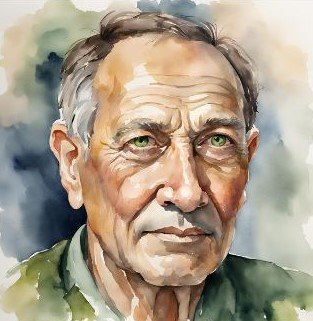Introduction
What happens when books are banned, and ideas are treated like dangerous weapons? In Fahrenheit 451, Ray Bradbury takes us to a world where firemen don’t put out fires; instead, they start them, burning books to silence knowledge. Why pick up this classic? It’s not just about censorship and forbidden stories; it dives deep into the power of ideas, the dangers of technology, and the courage it takes to think freely. This is one of those books that grabs you by the imagination and refuses to let go.
Plot Summary
High-Level Plot Summary
Imagine a world where firemen don’t save lives or fight fires—they start them to destroy knowledge. That’s the upside-down reality for Guy Montag. Living in a future where books are outlawed and thinking too much is basically a crime. Montag is great at his job: he burns the books, keeps everyone “happy,” and never asks questions. But his world turns upside down when he meets Clarisse, a curious and free-spirited teenager who sees magic in the world Montag has been taught to ignore. Her fresh perspective opens Montag’s eyes to the cracks in the system—and his own unquestioning loyalty to it.
As Montag’s curiosity grows, so does his discomfort with the life he’s always known. He starts hoarding books, hoping they hold answers to questions he can’t even fully articulate yet. His rebellion puts him at odds with his fire captain, Beatty, who wields the oppressive system’s ideology like a weapon. As Montag’s inner turmoil boils over, he faces a life-altering choice: stay safely numb in his predictable world or risk everything to reclaim his humanity through knowledge and individuality.
Core Conflict
At its core, Fahrenheit 451 is about a man waking up in a world that wants him to stay asleep. Individuality? Not important. Books? Too controversial. Why bother feeling uncomfortable or debating ideas when you can just “be happy” and avoid thinking too hard? In this society, technology is king—offering endless entertainment but leaving people. Imagine a world where firemen don’t save lives or fight fires—they start them to destroy knowledge. That’s the upside-down reality for Guy Montag. Living in a future where books are outlawed and thinking too much is basically a crime. Montag is great at his job: he burns the books, keeps everyone “happy,” and never asks questions. But everything shifts when he meets Clarisse, a curious and free-spirited teenager who sees magic in the world Montag has been taught to ignore. Her fresh perspective opens Montag’s eyes to the cracks in the system—and his own unquestioning loyalty to it. Hollow inside.
Montag’s struggle to break free from a system that thrives on ignorance is thrilling and tragic. The scariest part is that it’s eerily similar to what our world could look like tomorrow.
Key Characters
Protagonist
Guy Montag

Meet Guy Montag, the fireman who isn’t quite sure what he’s burning anymore—or why. At first, Montag is the picture of conformity, dutifully torching books and upholding the rules of his oppressive society. But when a spark of curiosity ignites within him, his transformation becomes the beating heart of the story.
Supporting Characters
Clarisse McClellan

Clarisse is the kind of neighbor who changes your life with a simple question. Full of curiosity and wonder, this bright teenager challenges Montag to see the world differently. Her love for conversation and simple pleasures catalyzes Montag’s awakening.
Mildred Montag

Mildred, Montag’s wife, is as plugged into her society’s shallow distractions as anyone can be. She spends her days immersed in TV walls and popping pills, completely detached from reality. Mildred represents the numbing conformity Montag begins to reject.
Captain Beatty

As Montag’s fire captain, Beatty is a fascinating paradox. He’s deeply intelligent, even philosophical, yet fiercely loyal to the system that demands censorship and ignorance. His sharp wit and cryptic speeches make him a formidable opponent in Montag’s journey.
Faber

Faber, a retired professor, guides Montag in the dangerous pursuit of knowledge. Though initially hesitant, Faber becomes an invaluable ally, helping Montag navigate the risks of rebellion and encouraging him to stand up for what matters.
Character Dynamics
Montag’s relationships are a study in contrasts. Clarisse and Faber pull him toward self-discovery and the pursuit of truth, while Beatty and Mildred embody the suffocating norms he’s desperate to escape. These dynamics create a rich tapestry of tension, growth, and resistance.
What to Look For While Reading
Fahrenheit 451 is more than a story; it’s a treasure trove of themes, symbols, and thought-provoking ideas. Keep these in mind as you read to unlock the deeper layers of Bradbury’s masterpiece:
Themes
Censorship: This novel examines the dangers of suppressing ideas and stifling creativity. Bradbury portrays the chilling consequences of a society that makes critical thinking unwelcome.
Conformity vs. Individuality: Montag’s journey is a tug-of-war between blending in and breaking free. Watch how he grapples with the pressure to conform while slowly embracing his own identity and thirst for knowledge.
Technology’s Role: In this world, technology doesn’t connect people—it isolates them. Mildred’s obsession with her TV walls starkly contrasts with Clarisse’s genuine human connection. Reflect on how technology can shape (or destroy) relationships.
Symbolism
Fire: Fire plays a double role. At first, it is a weapon of destruction, erasing ideas and knowledge. But as Montag’s perspective changes, fire becomes a symbol of warmth, enlightenment, and renewal.
The Mechanical Hound: Creepy and relentless, the Hound represents the soulless, dehumanized technology that enforces societal control. Watch its interactions with Montag—they’re packed with tension.
Books: Simple objects with profound meaning, books stand for freedom, rebellion, and the pursuit of truth. Notice how characters react to books, whether with fear, curiosity, or reverence.
Narrative Style
Ray Bradbury’s prose is like painting with words—vivid, emotional, and full of life. Take this line from the first chapter: “The flapping pigeon-winged books died on the porch.” See how he uses metaphor to bring the scene alive? He gives the books life by comparing them to fluttering pigeons, only to dramatize their destruction with the word “died.” It’s a powerful way of emphasizing the loss of knowledge.

Then there’s this gem: “While the books went up in sparkling whirls… with burning.” Bradbury turns the act of burning into something strangely mesmerizing. The “sparkling whirls” make the fire seem almost magical, but this beauty contrasts with the heartbreaking loss it represents. Through this lyrical description, Bradbury shows us the irony of destruction wrapped in elegance, making us feel the emotional weight of what’s being lost.
As Montag’s story unfolds, Bradbury’s tone shifts. He moves from an oppressive, detached tone to one that’s reflective and deeply philosophical, mirroring Montag’s internal transformation. The rich imagery and evolving tone bring Montag’s inner conflict and his oppressive world to life, making you feel every step of his journey.
As you read, let Bradbury’s poetic style guide your thoughts. Notice the layers in his language, and you’ll uncover even more depth in this unforgettable story.
Takeaway Lessons
In today’s world, it’s easy to avoid reading thought-provoking books. Fear of discomfort, a preference for convenience, or the lure of easy entertainment often keeps people from diving into complex ideas or controversial narratives. Instead, many turn to social media or quick, surface-level content that rarely challenges their thinking. Sound familiar? It’s not as extreme as the society in Fahrenheit 451, but the parallels are hard to ignore. Over-reliance on technology, shrinking attention spans, and discomfort with challenging ideas make Bradbury’s warnings feel eerily relevant.
Ray Bradbury seemed to predict this trend—people becoming passive, avoiding discomfort, and losing their curiosity. The burning of books in the novel feels like a powerful metaphor for abandoning knowledge and the richness of intellectual exploration. It’s not just about destroying physical books; it’s about losing the courage to think critically and question the world around us.
Fahrenheit 451 isn’t just a story; it’s a wake-up call. Bradbury reminds us of the dangers of shallow distractions and the value of genuine connection and free thought. In a time when information is everywhere, the book pushes us to think deeply, question what we’re told, and cherish meaningful conversations. Montag’s journey—from a passive enforcer of the system to a curious rebel—is a testament to how powerful curiosity can be, even when it comes at great risk. It’s a lesson that feels as urgent now as it did when the book was written.
Discussion Points
- Censorship Today: Think about how the book’s portrayal of censorship mirrors modern issues. Are there ideas or voices being silenced in our own world? How do we protect open dialogue?
- Tech Overload: Look at the parallels between the book’s obsession with shallow entertainment and today’s screen-obsessed culture. Do we rely too much on technology for connection, and what might we be losing in the process?
The lessons from Fahrenheit 451 are as relevant today as ever—maybe even more so. It’s a call to action: keep learning, stay curious, and don’t let the fire of knowledge go out.
Final Recommendation
Who Should Read This Book?
Honestly, everyone should read this book—if you can get your hands on a copy! But let’s break it down. If you love dystopian stories, Fahrenheit 451 is right up your alley. Wondering what happens when people stop reading, and ideas disappear? This one’s definitely for you.
Whether you enjoy thrilling tales or stories that make you question the world around you, this book has it all. It’s a must-read for anyone curious about the effects of censorship, the role of technology, and the struggle to hold onto individuality in a society that thrives on conformity. If you’re into gripping plots or deep, thought-provoking ideas, Fahrenheit 451 is calling your name.
Closing Statement
Books are magical—they open doors to endless worlds, spark new ideas, and offer fresh perspectives. For a book lover like me, the idea of living in a society like the one in Fahrenheit 451 is the stuff of nightmares. But take a moment to reflect: isn’t our world inching closer to something similar, even if it’s not as extreme? Ray Bradbury’s Fahrenheit 451 is so much more than a story—it’s a poetic reminder to cherish books, protect ideas, and embrace the freedom to think for ourselves. In a world often drowning in distractions, Montag’s journey feels like a wake-up call to focus on what truly matters. Don’t miss the chance to experience this timeless message for yourself. It’s a read that stays with you long after the last page is turned.